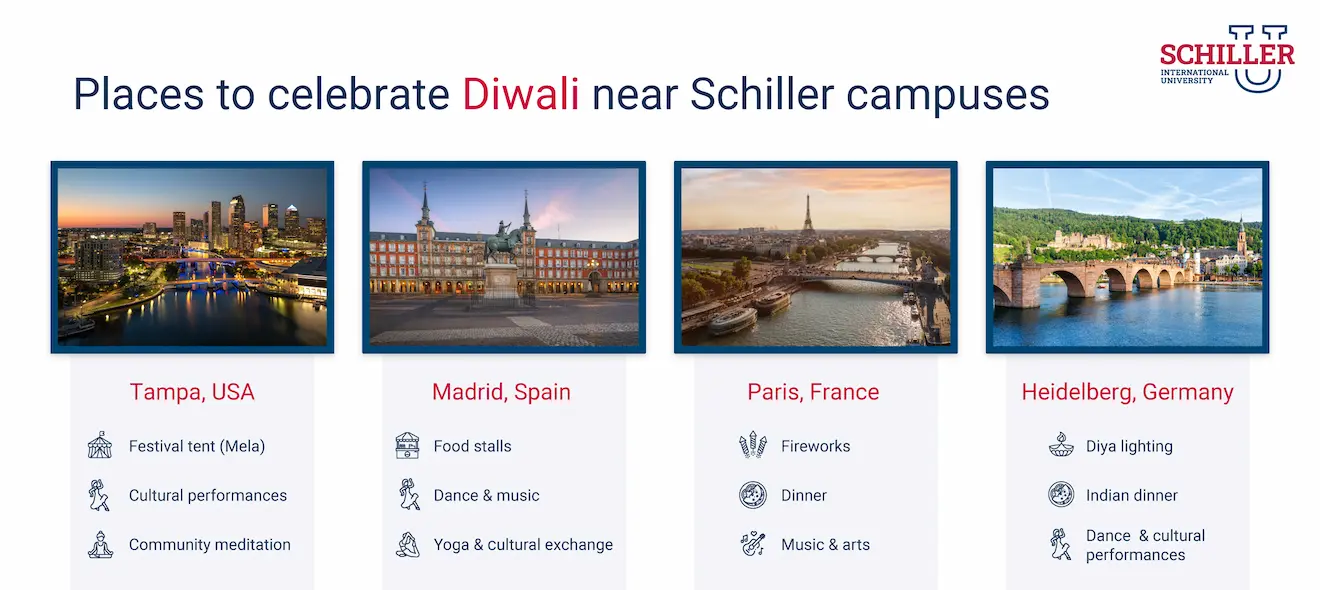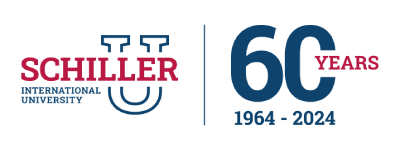Every autumn, as the leaves change colors, millions of people around the world celebrate Diwali, the festival of lights. With its origins in the Indian tradition, Diwali, which is derived from the Sanskrit word ‘deepavali,’ meaning “row of lights,” symbolizes the triumph of light over darkness, knowledge over ignorance, and hope over despair. Homes and streets glow with lamps, families share sweets, and communities come together in joy and reflection.
For international students, festivals like Diwali hold special meaning. They are more than cultural traditions. They are the reminders of home, opportunities for learning, and moments of togetherness in a global setting. At Schiller International University campuses, where students from more than 130 countries learn and grow together, celebrating Diwali is an opportunity to embrace diversity and participate in shared cultural experiences.
Schiller’s Multicultural Spirit
At Schiller, diversity is not just celebrated; it is lived every day. With campuses in Tampa, Madrid, Paris, and Heidelberg, students experience a truly global learning environment where cultural exchange is part of the classroom and campus life.
Marking festivals such as Diwali reflects Schiller’s mission to foster global citizenship and inclusivity. These celebrations are not just for those who grew up with the tradition. They are open invitations for students to join, learn, and connect. Whether it is lighting a diya (oil lamp made from clay or mud with an oil or ghee-dipped cotton wick), enjoying Indian music, or tasting a new sweet for the first time, embracing the spirit of Diwali is about building bridges across cultures and making everyone feel at home.
How International Students Can Celebrate Diwali on Schiller Campuses
At Schiller, every festival is a chance to discover something new and build connections, and Diwali is no exception. While the festival is deeply rooted in Indian culture, it carries universal themes of light, hope, and community, values that resonate with students from every corner of the world. On each campus, students can celebrate Diwali whether they are familiar with the festival or experiencing it for the first time.
On-Campus Traditions with a Global Twist
Diwali celebrations on Schiller campuses can transform student spaces into vibrant centers of culture and creativity:
- Lighting the Lamps: Coming together to light diyas is a simple but powerful act. It symbolizes the triumph of light over darkness while also creating an atmosphere of warmth and welcome. When done collectively, it becomes a shared ritual that transcends cultural boundaries and unites students in a spirit of positivity.
- Rangoli as Art and Expression: Creating rangoli, colorful floor patterns made with powders or flowers, becomes more than a decoration. For international students, it is an interactive way to learn about Indian artistic traditions, while also offering space for collaboration and cross-cultural creativity.
- Celebrating Through Dance and Music: A Bollywood-inspired evening can bring together rhythms, movements, and stories that highlight India’s vibrant performing arts. For many students, it is a chance not only to watch but to join in, bridging cultures through the universal joy of music and dance.
- A Taste of India: Sharing traditional sweets and savory snacks turns the celebration into a communal table where everyone is welcome. From ladoos and gulab jamuns to samosas and chai, food connects hearts and starts conversations across cultures.
Connections Across Campuses
Because Schiller’s community spans multiple countries, Diwali is also an opportunity to celebrate together, even from afar:
- Virtual Gatherings Across Borders: Students in Madrid, Paris, Heidelberg, and Tampa can exchange greetings and photos and even host live cultural showcases online, bringing campuses together in one shared festival of light.
- Student-Led Events: Student clubs and associations can take the lead in planning Diwali-themed evenings. From intercultural dinners to panel discussions, these events give students a voice in shaping how Diwali is celebrated and encourage genuine intercultural dialogue.
By combining traditional practices with opportunities for creativity and collaboration, Schiller campuses make Diwali more than just a festival. It becomes a shared experience of learning, belonging, and community, values that define life at Schiller.
Exploring Local Diwali Celebrations Near Campuses

One of the best ways to experience Diwali as an international student is to join local community celebrations. Across Schiller’s campuses in Tampa, Madrid, Paris, and Heidelberg, vibrant Diwali events welcome newcomers with music, dance, food, and the warmth of a shared tradition. These gatherings are open to people of all backgrounds, making them perfect for students looking to learn, connect, and celebrate.
Tampa, Florida
Florida Tampa Bay Diwali Mela
October 11, 2025, Sickles High School
A full-day festival with food stalls, cultural performances, henna, and family-friendly activities. Ideal for students to experience the energy of an Indian mela (fair or carnival).
Diwali Party 2025 - Indo US Chamber of Commerce
October 17, 6–10 PM, 2105 N Nebraska Ave
A lively evening with Indian food, social networking, and cultural exchange.
Celebrate Diwali: Festival of Lights - Tampa BK Meditation Center
October 19, 10:30 AM–12:30 PM
A peaceful celebration blending meditation, lunch, and community connection. Free and student-friendly.
Madrid, Spain
Indian Sindhi Association of Madrid Diwali
A major annual festival with dance, Indian food, and cultural performances. A great way for students to mingle with the local Indian and international communities.
You should also check the Madrid event listings closer to October for updates.
Paris, France
Diwali Dhamaka, Paris
October 18, from 11 PM to 5 AM
Celebrate Diwali with non-stop Bollywood music at F.M.R Club in Pigalle. A lively event perfect for students looking to experience the festival in a fun, social setting with local and international attendees.
Heidelberg, Germany
Heidelberg Diwali 2025: Festival of Light
October 18, 2025, Rohrbacher Kulturhaus
Includes diya lighting, Indian dinner, music, and dance in a warm, multicultural atmosphere. Last year’s celebration welcomed over 140 guests and is expected to grow.
The Value of Celebrating Diwali Abroad
Celebrating Diwali as an international student is an opportunity to immerse yourself in a living tradition, rather than just observing it.
- Develop Cross-Cultural Skills: Working together to organize events, create decorations, or perform traditional dances builds teamwork across diverse cultural perspectives.
- Practice Leadership and Initiative: Whether leading a rangoli competition, hosting a cooking session, or coordinating a virtual celebration with other campuses, students take ownership of the festival.
- Explore Creative Expression: Diwali offers many avenues for creativity, from designing innovative rangoli patterns to interpreting traditional music and dance in new ways.
- Reflect and Connect: Engaging in rituals, lighting diyas, or sharing sweets provides a reflective space to connect with one’s own culture while learning about others.
Diwali abroad is an exchange of perspectives. When students from different countries participate, they bring fresh interpretations and ideas, turning the celebration into a shared cultural dialogue.
Embracing Light and Diversity
At its heart, Diwali celebrates renewal, hope, and the power of light, principles that mirror Schiller’s commitment to nurturing thoughtful, engaged global citizens. Beyond the festival itself, participating in Diwali allows students to contribute to a vibrant campus culture.
The festival of lights becomes a platform for students to actively engage, share, and learn: creating rangoli designs together, hosting mini-workshops, or simply enjoying an evening of music and conversation. In this way, Diwali is not just a festival. It is a lived experience that builds connections, fosters understanding, and celebrates the rich tapestry of student life at Schiller.
FAQs
Q1. Why is Diwali called the festival of lights?
Answer: Diwali is called the festival of lights because it is celebrated by lighting diyas and candles, symbolizing the triumph of light over darkness, knowledge over ignorance, and good over evil.
Q2. Does Schiller International University celebrate Diwali on its campuses?
Answer: Schiller embraces multicultural traditions across its campuses in Tampa, Madrid, Paris, and Heidelberg. Students can celebrate Diwali by lighting diyas, creating rangolis, hosting cultural performances, and participating in themed social events.
Q3. How can international students take part in Diwali celebrations at Schiller?
Answer: Students can join campus activities, volunteer at organizing events, or collaborate with peers in cultural clubs. They can also attend community Diwali festivals in their host cities.
Q4. Where can students find Diwali events or supplies near Schiller campuses?
Answer: Students can attend community events in Tampa, Madrid, Paris, and Heidelberg. Indian grocery stores and local cultural associations in these cities also provide Diwali supplies such as diyas, sweets, and decorations.
Q5. Why is celebrating Diwali abroad meaningful for international students?
Answer: It allows students to honor their cultural heritage while inviting peers from other backgrounds to join in. Celebrating together creates belonging, promotes cultural understanding, and enriches the international student experience.

 Request information
Request information









